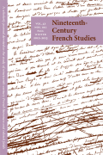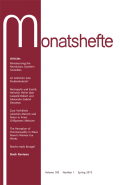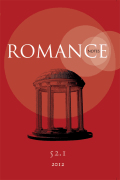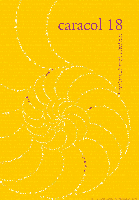
Anclajes
Scope & Guideline
Cultivating Knowledge Across Borders and Disciplines
Introduction
Aims and Scopes
- LGTB Literature and Culture:
A core focus on the exploration and representation of LGTB identities in literature and culture, particularly within the contexts of Spain and Latin America. This includes analyses of pride, shame, and the socio-political implications of these identities. - Cultural Memory and Trauma:
Investigating how literature reflects and shapes cultural memory, particularly concerning trauma related to violence, war, and repression in Latin America. The journal emphasizes narratives that confront historical injustices and personal trauma. - Gender Studies and Sexuality:
A consistent engagement with gender and sexuality studies, examining how literature and language intersect with issues of gender identity, feminist theory, and queer studies. - Interdisciplinary Approaches:
Utilizing interdisciplinary methodologies that incorporate literary theory, cultural studies, history, and sociology to provide a comprehensive understanding of the texts and contexts being studied. - Postcolonial and Transnational Perspectives:
Exploring the effects of colonial histories and transnational dialogues in Latin American literature, highlighting how these themes influence contemporary narratives and identities.
Trending and Emerging
- Intersectionality in Identity:
A growing trend towards exploring intersectional identities, particularly how race, gender, and sexuality intersect in literary representations, reflecting broader societal conversations about diversity and inclusion. - Narratives of Resistance and Activism:
Increased focus on literature that serves as a form of resistance against dominant narratives, particularly in the context of LGTB rights and social justice movements. This theme underscores the role of literature in activism. - Contemporary Cultural Critique:
An emerging emphasis on contemporary cultural critique, particularly how current socio-political issues are represented in literature. This includes examinations of neoliberalism, globalization, and their impacts on identity. - Digital Humanities and New Media:
An interest in how digital humanities and new media are reshaping literary studies, including the analysis of online texts and digital narratives, which reflects the changing landscape of literature consumption. - Memory Studies and Trauma Literature:
An ongoing exploration of memory studies, particularly how trauma is represented in literature. This trend indicates a desire to understand personal and collective memories in the context of historical violence and oppression.
Declining or Waning
- Traditional Literary Forms:
There seems to be a decline in the exploration of traditional literary forms and canonical texts, as the journal increasingly prioritizes contemporary and experimental narratives that challenge established norms. - Historical Narratives without Critical Context:
Themes centered solely on historical narratives without engaging with contemporary socio-political contexts are becoming less frequent, as the journal emphasizes critical analysis that connects past and present. - Non-Literary Discourses:
Papers focusing on non-literary discourses, such as purely historical or biographical accounts without a strong literary analysis component, appear to be waning, indicating a preference for texts that offer deeper literary critique.
Similar Journals

Impossibilia-Revista Internacional de Estudios Literarios
Charting New Territories in Literary ResearchImpossibilia-Revista Internacional de Estudios Literarios is a premier open access journal dedicated to the vibrant field of literary studies, published by ASSOC CULTURAL IMPOSSIBILIA since 2011. With its ISSN 2174-2464, this international journal encourages the exploration and analysis of diverse literary theories, texts, and contexts, making it an essential resource for researchers, scholars, and students alike. Hailing from Granada, Spain, Impossibilia not only fosters academic discourse in literature but also promotes intercultural dialogue through its commitment to accessibility and inclusivity. While data such as H-index and Scopus rankings are still to be developed, the journal's focus on enriching the literary landscape ensures its growing impact and relevance within the academic community.

NINETEENTH-CENTURY FRENCH STUDIES
Exploring the Depths of 19th-Century French LiteratureNINETEENTH-CENTURY FRENCH STUDIES, published by University of Nebraska Press, is a premier academic journal dedicated to the exploration and analysis of French literature and culture from the 19th century. Established as a vital resource for scholars in the field, this journal is recognized for its contribution to literary studies, holding a commendable Q2 rating in the 2023 category of Literature and Literary Theory, reflecting its academic rigor and relevance. With an ISSN of 0146-7891, it offers a platform for innovative research and scholarly discourse, delving into critical topics that shape our understanding of the era. Although it does not currently operate as an open-access journal, its impactful research is instrumental in guiding literary analysis within the arts and humanities. As it continues its publication journey, converging from 2001 to 2024, NINETEENTH-CENTURY FRENCH STUDIES remains essential for researchers, professionals, and students aiming to gain deeper insights into the complexities of 19th-century French literature.

Abriu-Estudos de Textualidade do Brasil Galicia e Portugal
Advancing Knowledge in Textual Studies Across BordersAbriu-Estudos de Textualidade do Brasil Galicia e Portugal, published by UNIV BARCELONA, FACULTAD FILOLOGIA, is a pivotal open-access journal dedicated to the expansive study of textuality across Brazil, Galicia, and Portugal. Since its inception in 2012, this journal has become an essential resource for researchers, scholars, and students interested in the interconnections among literature, linguistics, history, and the arts. With a commitment to fostering academic discourse, Abriu presents a diverse range of articles that examine the richness of cultural and linguistic expressions within the Iberian Peninsula and beyond. With-category quartile rankings of Q3 in History and Q4 in Linguistics and Language, the journal reflects its growing influence in the respective fields, while Scopus rankings underscore its commitment to high-quality scholarship. By providing open-access options, Abriu ensures that valuable knowledge remains accessible to all, furthering its objective to bridge cultures and disciplines in contemporary discussions. The journal’s scope spans critical analyses and innovative approaches in textual studies, making it a vital platform for advancing research and discourse.

Monatshefte
Fostering Innovation in Literature and LinguisticsMonatshefte is a prestigious academic journal published by the University of Wisconsin Press, dedicated to fostering scholarly discourse in the field of German Studies. With its ISSN 0026-9271 and E-ISSN 1934-2810, Monatshefte serves as a vital platform for researchers and students, offering peer-reviewed articles that delve into literature, culture, and linguistics. The journal plays an essential role in advancing knowledge and understanding of German intellectual traditions, making it indispensable for anyone interested in the dynamics of German culture. Although it is not an Open Access publication, its rigorous selection of high-quality research articles ensures its impact within the academic community. For researchers aiming to stay at the forefront of German Studies, Monatshefte provides a wealth of insights and critical analyses, fostering enhanced academic dialogue and innovation.

ROMANCE NOTES
Unveiling New Horizons in Romance LiteratureROMANCE NOTES is a prominent journal published by the University of North Carolina, dedicated to the study of Literature and Literary Theory. Since its inception in 1975, the journal has evolved to encompass critical and interdisciplinary perspectives on romance languages, examining both classic and contemporary texts. Aiming to bridge scholarly discourse and literary practice, ROMANCE NOTES invites contributions that explore various dimensions of language, culture, and artistic expression, making it an essential resource for researchers, professionals, and students alike. With an established presence in the academic community and a current ranking of Q3 in its category for 2023, it serves as a vital platform for emerging scholarship. The journal, based in Chapel Hill, North Carolina, continues to foster a rich dialogue within the field, offering an invaluable contribution to the understanding of romance languages and their literary significance.

Dicenda-Cuadernos de Filologia Hispanica
Cultivating a Vibrant Community of Philological InquiryDicenda-Cuadernos de Filologia Hispanica, published by UNIV COMPLUTENSE MADRID, SERVICIO PUBLICACIONES, is a distinguished academic journal in the fields of linguistics, literature, and literary theory. Since its transition to Open Access in 2017, it has facilitated unrestricted dissemination of knowledge, making it an invaluable resource for researchers, scholars, and students interested in the rich tapestry of Hispanic philology. With an impact factor reflected by its Scopus rankings—at Q3 in Linguistics and Language and Q2 in Literature and Literary Theory—Dicenda serves as a vital platform for innovative research and critical discourse. The journal actively encourages submissions that explore contemporary and historical perspectives within its scope. Located in Madrid, Spain, the journal has steadily established itself as a significant contributor to the ongoing dialogue in the humanities, fostering a deeper understanding of linguistic and literary phenomena.

Caracol
Cultivating a Global Dialogue on Communication DynamicsCaracol is a distinguished academic journal published by UNIV SAO PAULO, FAC FILOSOFIA, dedicated to exploring the intricate realms of Communication and Linguistics. With an Open Access policy since 2010, Caracol ensures that its rich repository of knowledge is readily accessible to researchers, professionals, and students alike. This Brazilian journal, with its ISSN 2178-1702 and E-ISSN 2317-9651, proudly holds a Q3 ranking in Communication and a Q2 ranking in Linguistics for 2023, reflecting its commitment to high-quality scholarship. As it converges from 2019 to 2024, Caracol aims to bridge theoretical frameworks and practical insights, fostering an environment for multidisciplinary discourse. This journal is notably positioned in the Scopus ranking, with respectable standings in the fields of Arts and Humanities and Social Sciences, underscoring its relevance and importance in understanding language and communication dynamics. With its base in São Paulo, Brazil, Caracol is not just a publication; it is a platform for innovative ideas that resonate within local and global academic communities.

MESTER
Exploring the Nexus of Language, Culture, and TheoryMESTER is a distinguished academic journal published by the UCLA College of Humanities, known for its commitment to advancing research in the fields of Cultural Studies, Linguistics and Language, and Literature and Literary Theory. With an ISSN of 0160-2764, this journal serves as a vital platform for scholars and professionals to disseminate innovative research and critical perspectives from diverse theoretical frameworks and cultural contexts. Although currently operating without an Open Access model, MESTER continues to uphold a rigorous peer-review process, ensuring that published articles maintain high academic standards. Recognized for its selective focus, MESTER holds a Q4 categorization in Cultural Studies and Linguistics, and Q3 in Literature and Literary Theory, situating it as a relevant, if emerging, voice within these disciplines. Housed within the significant repository of knowledge at UCLA, the journal beckons researchers, students, and practitioners to engage with its contributions to the humanities and build upon its foundations in cultural discourse.

PORTUGUESE STUDIES
Unveiling the Richness of Portuguese HistoryPORTUGUESE STUDIES is a prominent academic journal published by the Modern Humanities Research Association, dedicated to exploring the rich tapestry of Portuguese culture, history, and literature. With its ISSN 0267-5315 and E-ISSN 2222-4270, the journal has been a vital resource for scholars since its inception in 2002 and continues to contribute valuable insights into the study of Portuguese heritage. Operating from its base in the United Kingdom, the journal encompasses a diverse range of topics that reflect its dynamic scope within Cultural Studies, History, and Literature and Literary Theory. Although currently not categorized as Open Access, the journal's scholarly contributions have attained respectable Scopus rankings, with Q4 and Q3 placements illustrating its growing influence within the academic community. Researchers, professionals, and students alike will find PORTUGUESE STUDIES an indispensable platform for enriching their understanding and discourse on Portuguese affairs, ensuring its crucial role in fostering intellectual engagement and discovery in the humanities.

Literatura e Autoritarismo
Charting the Complexities of Literary ResistanceLiteratura e Autoritarismo is a leading academic journal dedicated to exploring the intricate relationships between literature and authoritarian regimes. Published by Universidade Federal de Santa Maria, this Open Access journal has been disseminating knowledge since 2003, making significant contributions to the fields of literary studies, political science, and cultural analysis. With an ISSN of 1679-849X, it serves as a vital platform for researchers and students seeking to investigate how literature responds to and shapes authoritarian contexts. The journal's commitment to accessibility ensures that its scholarly articles are freely available to a global audience, fostering diverse scholarly dialogue. Positioned in a critical niche, Literatura e Autoritarismo is dedicated to advancing understanding of how literary discourse can illuminate the complexities of power, resistance, and identity under oppressive regimes, making it an essential resource for those engaged in this vital area of study.